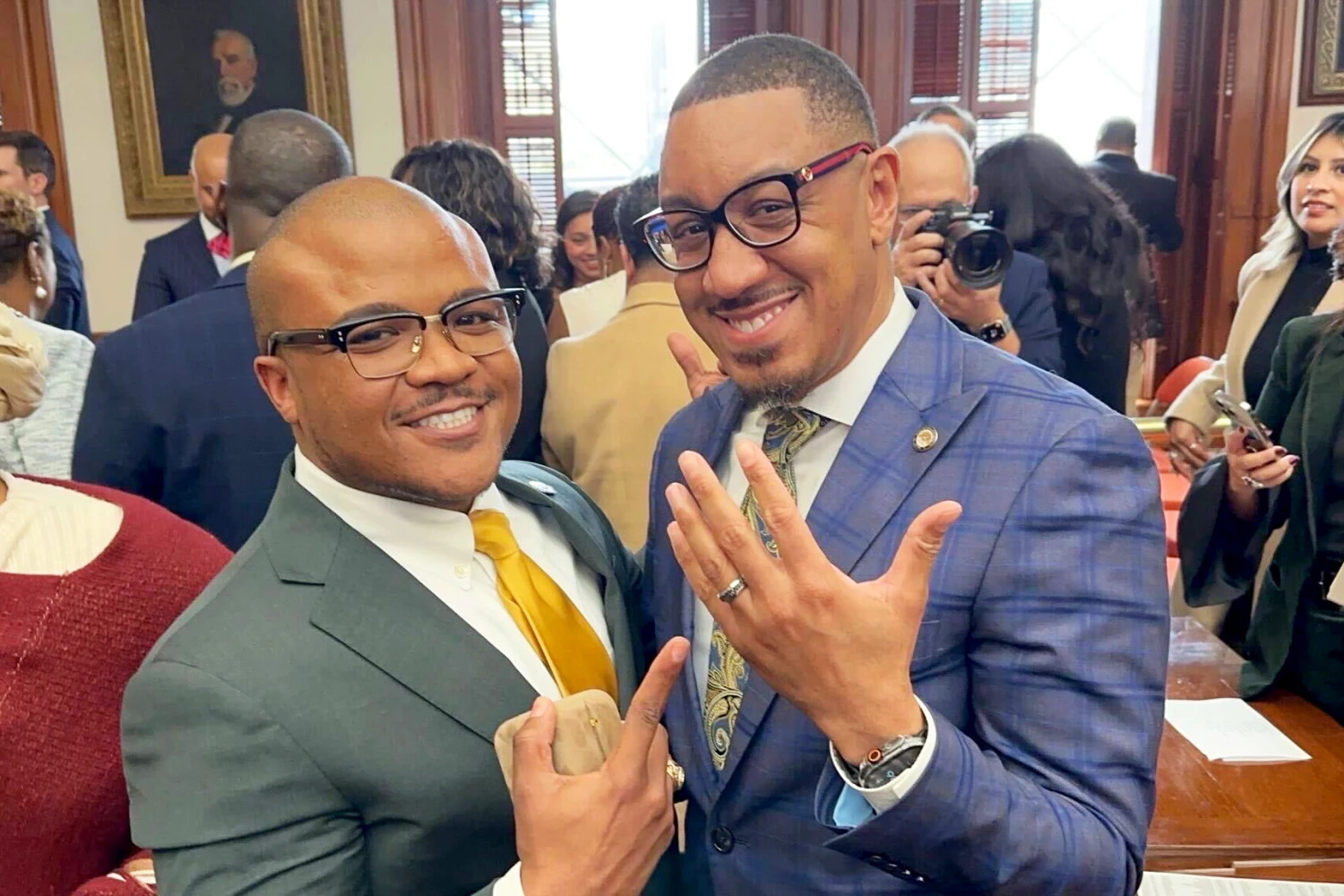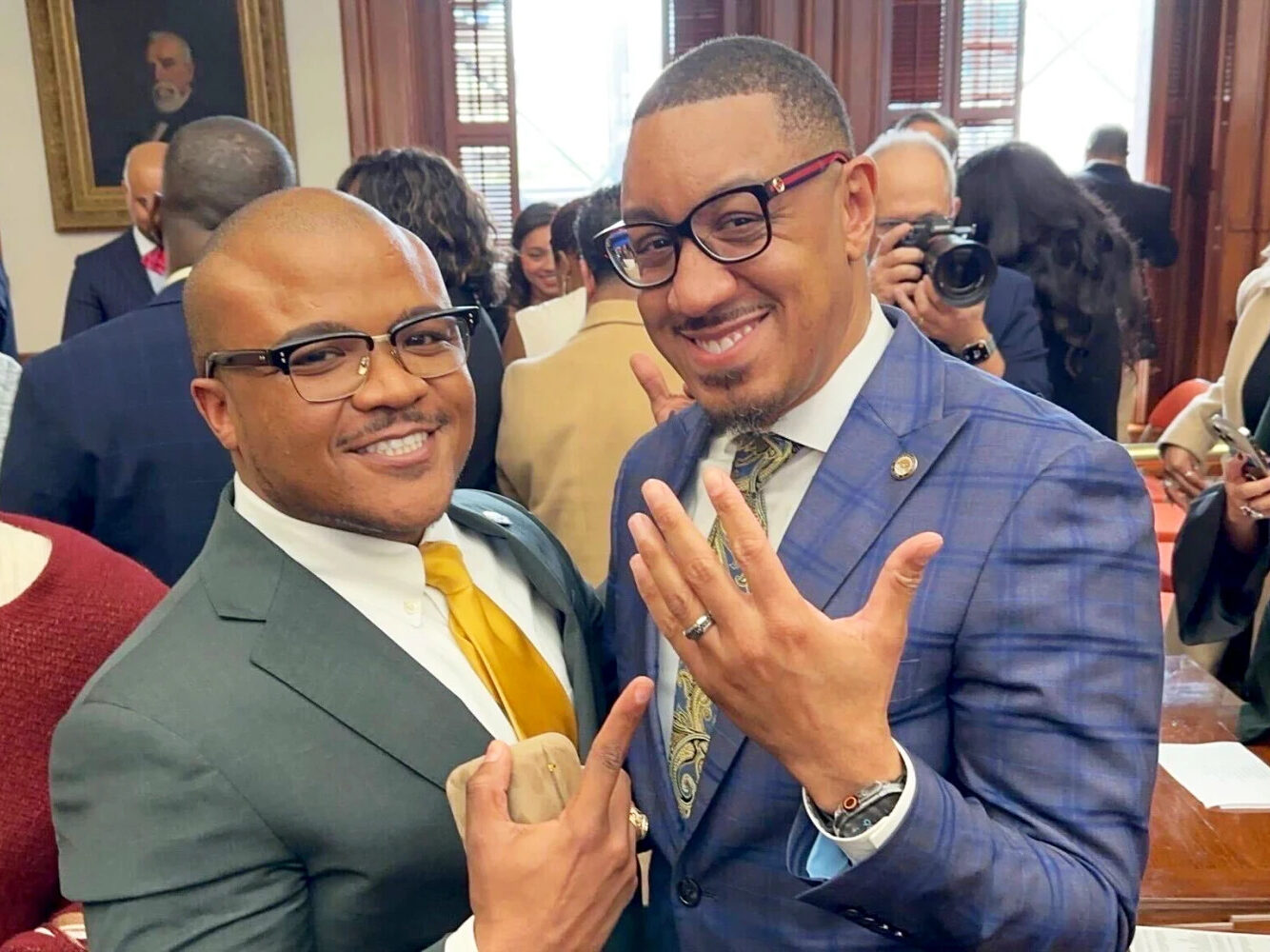


Legislative bodies have begun their new terms of office,
and with Republicans taking further control of power,
many in the LGBTQ+ community have expressed their
outrage and fear over what policies will affect their lives over
the next two to four years. However, legislators within the
community are arriving at their respective Capitols with
excitement and hope for the future, determined to protect
their rights while continuing to work with lawmakers to
deliver for their constituents. One of those representatives
is Venton Jones, a state rep from Dallas. When the Texas
House convened to open the 89th Legislative Session,
Jones decided to start his second term with a “deeply
personal and historic gesture” when he proposed to his
partner, Gregory Scott Jr., on the middle of the House
floor, according to a press release from Jones’ office.
Surrounded by family, friends, colleagues and supporters
Jones, who was recently elected both as Texas House
Democratic Caucus whip and vice-chair of the Texas
LGBTQ Caucus, got down on one knee and asked
Scott to marry him, where the was met “with cheers and
a resounding ‘YES’ from Mr. Scott.” Shortly after the
proposal, the House proceeded to an unprecedented two
rounds of voting for the Speaker of the House, electing
Lubbock Republican Rep. Dustin Burrows through a
coalition of Republicans and Democrats. While the House
has not begun voting on bills affecting the legislative
priorities of the government, they have begun voting on
the rules and structure over the next session, including
a controversial resolution that banned Democrats from holding
chairmanship of committees. However, many on the far right
are complaining that Democrats are still allowed to hold vice
chairmanships and, in some cases, spots on committees entirely.
With the current leadership of Texas being motivated in
part by federal pressure, it remains to be seen how deep
the Legislature will attempt to target the LGBTQ+ community
this session. With the Trump administration taking firmer shape,
the first essence of anti-queer bills being pushed nationally are
finally being unleashed.
While the Texas House began its session, the United
States Congress began its new legislative term in January
as well, seeing the Republicans continue to hold onto the
House by a smaller margin led by Speaker Mike Johnson.
The Texas delegation remained unchanged in their partisan
balance, however several seats saw the introduction of new
faces into the Rotunda, including former state rep now
Congresswoman Julie Johnson of Farmers Branch. In her
inaugural address to the House, she gave key highlights
over her record protecting LBGTQ+ Texans while fighting
for the middle class across the spectrum. “As the trusted
voice for Texas’ 32nd Congressional District in Congress,
I am ready to deliver real results for my neighbors.” said
Johnson in her address. “That means working to lower
costs across the board; support and expand infrastructure
for the fastest growing metroplex in the country; secure
our southern border; and make healthcare safe, affordable,
and reliable for all Americans.”
While Rep. Johnson painted a bright future ahead of Texas
in the next session of Congress, one of her first votes was
an all too familiar protection of the LGBTQ+ community by
voting against a bill to ban transgender and intersex girls and
women from competing in school athletics. H.R. 28 amends
existing law to make it a violation of Title IX for recipients of
federal financial assistance to allow transgender girls or women
to participate in girls’ and women’s athletic programs,
effectively banning all trans girls and trans women from participating
on school sports teams. It would also limit the ability of
non-binary and intersex students to participate in these
programs as well. While the 216-206 vote fell mostly along
party lines, Texas Democrats Vicente Gonzalez of McAllen and
Henry Cuellar of Laredo voted in favor of the bill. Democrat Don
Davis of North Carolina voted “present.” The votes on
the bill drew sharp criticism from fellow Democrats in the
chamber and LGBTQ+ activist groups, calling the bill “an
unconscionable attack on transgender girls and women
across the country.” Rep. Mark Takano of California
says the bill being one of the first to be passed by this new
Congress taints the very image of the institution. “Once
again, Republicans have proved that their obsession
with attacking trans people trumps lowering the cost of
groceries or investing in our schools.” Takano said in a
statement.
“It’s shameful that one of the first bills to pass the House
this Congress limits transgender girls’ ability to be a part of
their school’s community, prevents kids from playing with
their friends, and could force any girl to answer invasive
personal questions about their bodies and face humiliating
physical inspections to ‘prove’ that they’re a girl, […]
Speaker Johnson and the Republican Conference are more
focused on passing legislation that targets transgender
children for exclusion and puts all girls at risk than working
to address the problems impacting Americans daily.”
While the general attitude of the new Republican
legislatures appears grim for the LGBTQ+ community,
the more seasoned lawmakers are motivated and ready
to continue defending the values previous generations of
queer leadership had fought for, and hope that keeping
their own attitudes positive and hopeful will inspire the
same feelings onto their allies in the fight ahead.




